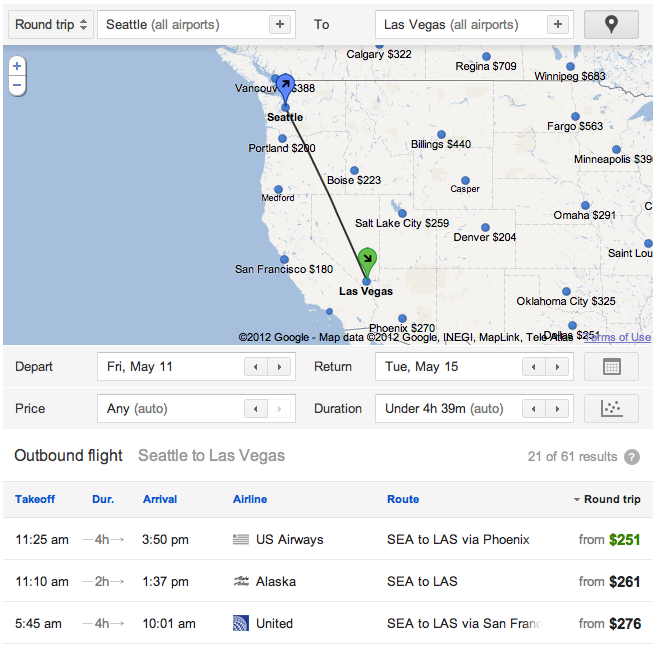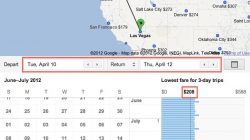There’s an interesting article on Google’s acquisition of ITA published yesterday in Xconomy, an online business magazine. While a review I wrote a few weeks ago agreed that Flight Search is still in its infancy (I need to cover Hotel Finder at some point), it has incorporated a few tools with the potential to make searching for mileage runs easier. I found the article interesting for where it sees the potential of developing ITA’s technology under Google’s umbrella and the few details Google gave about what it plans to do next.
Since Google doesn’t like to talk a lot about its future plans, most of the “hard” information in the article is stuff we already know. Why Google wanted to acquire ITA to get its foot in the door of travel, which is to make it as easy as searching for and purchasing a book or anything else online. That Google readily admits its search product is still a work in progress. That Google hopes its larger size will encourage more airlines to sign onto ITA’s new PSS booking system currently used only by Cape Air. The message from the article is that most airlines are disappointed with Google’s progress so far.

But the actual innovation taking place to help the consumer during his or her journey are less clear, and the author has to make some guesses. Could Google combine data from your hotel search and flight search to get your bags automatically delivered to your hotel when you misconnect? Probably, but I didn’t have any trouble requesting this manually the last time that happened, and my hotel was 40 miles away. Could Google get airlines to pick up and deliver the bags directly to the hotel? Yeah, right! I don’t imagine those ads offering to FedEx your luggage are especially popular as the hassle of taking your bag to the airport isn’t that great for most people. Pre-packing and paying extra for delivery is not always preferable. Frequent travelers are even less likely to use such a service since they pack light and carryon anyway.
Google’s real goal seems to be that if it can make the ideal travel “search” engine, it will be able to learn and process everything it needs to know about your past and future travel history, your preferences, your tendency toward business or leisure travel, etc. The problem isn’t actually searching for prices and itineraries but making them easy to sort through and presenting the wheat without the chaff. That not only allows it to deliver better results but also allows it to target better ads, and better ads means greater revenue. I would not expect Google to create radical new services just for fun unless they actually help you achieve your goal more easily, much as it has done for traditional search and email.
Traditional meta-search, along the lines of Kayak and to some extent Hipmunk, is becoming less and less important as consumers begin to place greater value on making sense of all that information, not just finding the lowest price. I couldn’t agree more. It’s less common in my experience to see wildly different prices for the same hotel room or flight, and often the lowest price can be had by checking with the actual airline or hotel operator. One of the reasons I like Hipmunk is that it worries less about comparing dozens of sites or sharing thousands of options than it does about whittling down those options to the few most likely to be what you’re looking for. And when I use Kayak, it’s often after I’ve already found my preferred flight or hotel somewhere else and just want to confirm the lowest available price.
Have any of you tried using Google’s Flight Search or Hotel Finder services lately, and do they work any better than what you’ve tried in the past? What do you think is going to happen as Google continues to develop and integrate ITA’s technology into its own?

